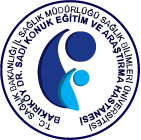ABSTRACT
Objective:
The aim of this study is to investigate the effectiveness of unipolar radiofrequency ablation in patients in whom valve replacement was performed for persistent atrial fibrillation.
Material and Methods:
In our study 22 patients were included which had concomitant mitral valve replacement and left atrial ablation between January 2010-January 2012. Mid-term control and postoperative electrocardiography records of the patients were evaluated retrospectively. In addition, the effects of cardiac function on postoperative AF were investigated.
Results:
After cardiopulmonary bypass, 14 (63.6%) patients maintained normal sinus rhythm, including one patient with the support of a temporary pace among 8 (36.3%) patients observed in the intensive care unit after replacement. In the early period, one patient died due to low flow, and prolonged intubation. At the end of the first month, 15 (71.4%) patients were in sinus rhythm, 6 patients (28.6%) had persistent atrial fibrillation. By the tenth postoperative month permanent pace maker was implanted to a patient with persistent atrial fibrillation. At the end of 6 th month he had no atrial fibrillation.
Conclusion:
The success achieved with the unipolar radiofrequency left atrial ablation was found to be consistent with the findings of the literature. In our study, patient age and pulmonary hypertension was evaluated as predictive of ongoing postoperative AF.



